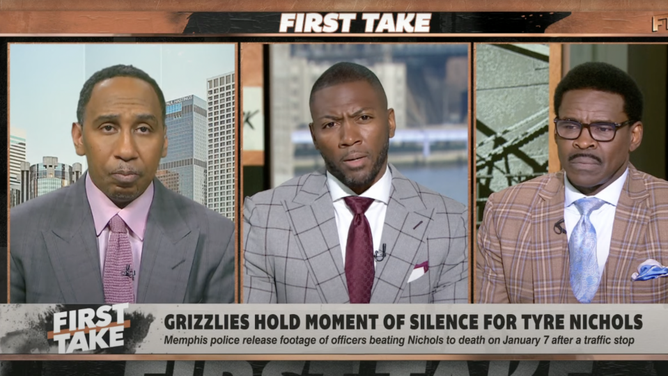ESPN Segment On Tyre Nichols Proves Network's Lack Of Diversity
ESPN addressed the body cam footage of the five black Memphis police officers beating black man Tyre Nichols to death.
The segment proved ESPN's continued disregard for diversity -- diversity of mind, that is.
The not-so-diverse panel of Stephen A. Smith, Ryan Clark, and Michael Irvin declared Nichols' death a racial matter. Clark argues the tragedy is not a white-black issue, but an issue between the black and blue issue.
"It wasn’t about black, it wasn’t about white, it wasn’t about brown, it wasn’t about yellow," says Clark. "It was about blue and the way that blue sees black.”
The full segment appears below:
Clark essentially states, on a sports network, that policing is rooted in white supremacy. He tried to make the point that even black officers have inherent negligence for other black lives.
His case is not dissimilar to Jemele Hill's. Last Friday, she blamed white supremacists for Nichols' death.
"Just as women sometimes carry the water for misogyny and the patriarchy, Black people have definitely done the same for white supremacy. You’re stuck on the faces. I’m looking at the system and why it was created," Hill tweeted of the Nichols' attack.
The issue with ESPN discussing social issues is not the mere decision to venture away from sports. The issue, however, is that the channel delves into said topics with only panelists who agree.
That creates an echo chamber of hysteria, and based on past examples, the spread of false information.
Had the network positioned someone with a different opinion than Clark, they could have made him dig deep, more thoroughly. An informative conversation could have ensued.
Or course, Smith and Irvin did not provide a counter.
The segment painted policing broadly. The intention was to use the five disgraced officers as an indictment against all policing in America.
Such strategy is often the case at ESPN. The network tends to generalize, grouping all police, white people, black people, etc into groups. Individuality be damned.
The five officers acted horrifically. They deserve to face the murder charges that await them. The press should scrutinize each of them. Yet, the five men do not represent the entire force. Or even the force in Memphis.
Tragedy is not racist

ESPN discusses Tyre Nichols.
The ESPN segment also attributed Nichols' attack to racism. What proof does Clark have? He doesn't have any.
There's no proof the cops beat the man on the basis of his skin color. Likewise, there's no proof Chauvin killed George Floyd on account of racism. There's also no proof the black cops who kill white people are doing so because of skin color.
The country is filled with bad actors, both black and white. Some of them are, unfortunately, police officers.
That's not racism. That's a failure to weed out menacing officers. It's a personnel issue.
Not all tragedies involving black people are racist. Yet, networks like ESPN select only a number of stories each year to promulgate otherwise, to affirm their hypothesis that anti-black racism looms over the country on a macro level.
If ESPN prioritized diversity of thought, the network could have made the above argument along with Clark's.
At that point, the viewers could decide for themselves. Instead, ESPN fed them an anti-police talking point, one absent of detail, substance, and facts.